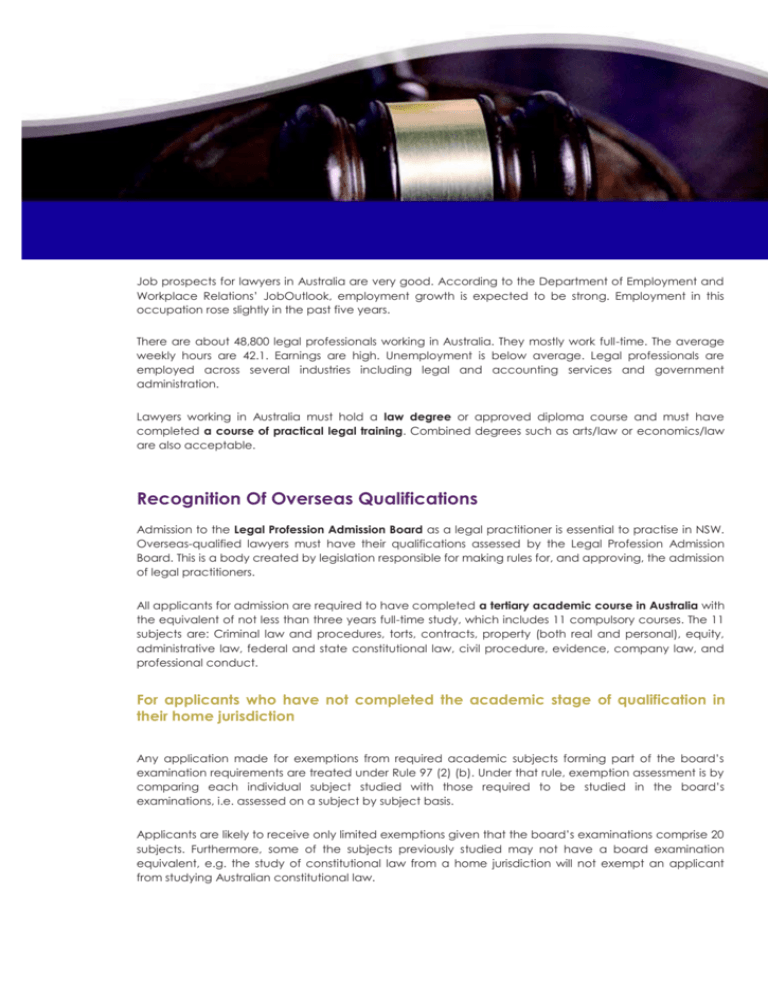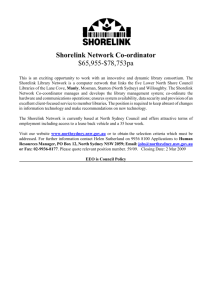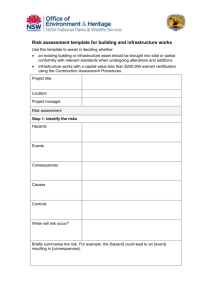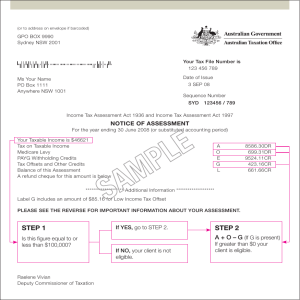The Legal Profession in Australia - equity
advertisement

The Legal Profession in Australia Job prospects for lawyers in Australia are very good. According to the Department of Employment and Workplace Relations’ JobOutlook, employment growth is expected to be strong. Employment in this occupation rose slightly in the past five years. There are about 48,800 legal professionals working in Australia. They mostly work full-time. The average weekly hours are 42.1. Earnings are high. Unemployment is below average. Legal professionals are employed across several industries including legal and accounting services and government administration. Lawyers working in Australia must hold a law degree or approved diploma course and must have completed a course of practical legal training. Combined degrees such as arts/law or economics/law are also acceptable. Recognition Of Overseas Qualifications Admission to the Legal Profession Admission Board as a legal practitioner is essential to practise in NSW. Overseas-qualified lawyers must have their qualifications assessed by the Legal Profession Admission Board. This is a body created by legislation responsible for making rules for, and approving, the admission of legal practitioners. All applicants for admission are required to have completed a tertiary academic course in Australia with the equivalent of not less than three years full-time study, which includes 11 compulsory courses. The 11 subjects are: Criminal law and procedures, torts, contracts, property (both real and personal), equity, administrative law, federal and state constitutional law, civil procedure, evidence, company law, and professional conduct. For applicants who have not completed the academic stage of qualification in their home jurisdiction Any application made for exemptions from required academic subjects forming part of the board’s examination requirements are treated under Rule 97 (2) (b). Under that rule, exemption assessment is by comparing each individual subject studied with those required to be studied in the board’s examinations, i.e. assessed on a subject by subject basis. Applicants are likely to receive only limited exemptions given that the board’s examinations comprise 20 subjects. Furthermore, some of the subjects previously studied may not have a board examination equivalent, e.g. the study of constitutional law from a home jurisdiction will not exempt an applicant from studying Australian constitutional law. For applicants who have completed the academic stage of qualification in their home jurisdiction Those applicants will be assessed under different criteria. For those who have not been admitted to practise law, they will be assessed under Rule 97(2)(c). For those who have been admitted but who have not practised, they will be assessed under Rule 97(2)(d). For applications who have been admitted and who have practised, they will be assessed under Rule 97(2)(e). The board’s website gives guidance as to the likely level of exemption for certain jurisdictions. A person who has successfully completed the academic stage of qualification in their home jurisdiction may be required to study a maximum of 13 of the board’s one semester subjects. This total will be less if the Academic Exemptions Sub-Committee determines that exemptions can be awarded for one or more of these 13 subjects. In particular, applicants who have evidence of at least five years post-admission legal experience of a sufficiently general nature may gain a further exemption from studying Australian constitutional law. Studying Subjects Required Upon a determination by the Academic Exemptions Sub-Committee, any subject that is to be satisfactorily completed may be studied through the Law Extension Committee of the University of Sydney (LEC). If study is not possible through the LEC there are alternative study options available with other legal education providers. Practical Legal Training Requirement To fulfil the practical training requirement an applicant must have completed a practical legal training course accredited by the board. Applications for exemption from this requirement should be made to the Practical Training Exemptions Sub-Committee. Exemptions are only given where the applicant has shown that they had gained competencies substantially equivalent to those expected of a person who has successfully complete a practical legal training programme accredited by the board. Upon successful completion of these requirements, the Board will recommend to the Supreme Court of NSW admittance as a legal practitioner. All legal practitioners are sworn in by the court before being able to practise. Once admission has been granted an overseas-qualified lawyer can elect to practise as a solicitor or a barrister. In Australia, lawyers wishing to practise as a solicitor need to apply to the Law Society of NSW to be issued with a practising certificate as a solicitor. Additional training may be needed. Lawyers wishing to practise as a barrister need to apply to the NSW Bar Association to be issued with a practising certificate as a barrister. They will be required to complete the Bar Reading Program offered by the NSW Bar Association before being issued with a practising certificate. Additional training may be needed. Neither the Law Society of NSW nor the NSW Bar Association plays a part in admission matters. THE STEPS 1. Apply for academic exemptions to the Legal Profession Admission Board 2. Enrol for and undertake the required academic subjects 3. Apply for exemptions from practical training or complete a training course 4. Apply for admission to the Legal Profession Admission Board 5. Apply to the Law Society of NSW to practise as a solicitor, or Apply to the NSW Bar Association to practise as a barrister 6. Seek employment Areas of Specialisation Administrative law (includes human rights and immigration) Children’s legal issues Family law Property law (environmental, planning/local government) Medico-legal law Employment and industrial law Criminal law Alternative dispute resolution Business law Personal injury Taxation law Wills and estate Employmen t A law degree opens up the possibility of many varied careers: Government legal officer All state and federal government departments employ lawyers for legal and policy work, such as the Attorney Generals Department, Foreign Affairs, Department of Justice, Department of Human Services, Premier and Cabinet. Statutory bodies There are also a number of statutory bodies which deal with a range of issues that employ qualified lawyers, such as the Australian Securities and Investments Commission, Human Rights and Equal Opportunities Commission and the Australian Law Reform Commission. Advocacy and community sector work For lawyers with an interest in defence and advocacy work there are a number of advocacy bodies established under statue and in the community sector, which provide opportunities for employment. An associateship An option that may be suited to lawyers thinking of a career as a barrister is to work as an associate to a judge in either the High Court, Federal Court or Supreme Court. These positions normally last for 12 to 18 months and provide lawyers with a good insight into how the law operates in practice, exposing them to court proceedings and also the advocacy skills required to be a barrister. Contact the courts for more information (see details below). International opportunities All large commercial law firms have overseas offices, which provide opportunities to work overseas. The United Nations system and its various agencies provide opportunities in a variety of fields, as well as non-government organisations, Amnesty International, Human Rights Watch and the International Committee of the Red Cross. Paralegal professions - law clerk, legal assistant, legal executive, litigation, settlements officer Paralegal professionals work under the supervision of lawyers in the private and public sectors. Paralegals work closely with lawyers, judges and prosecutors. While lawyers assume the ultimate responsibility for legal work, paralegals assist in all phases of case management and trial preparation. This option can offer some opportunities for overseas-qualified lawyers to gain some local experience. Work experience Work experience involves working normal hours without receiving a salary for a short period. Gaining local work experience in a legal firm or a community legal centre can be a crucial element in adjusting to the Australian context, as you will gain an insight into how the law operates in practice, exposing you to court proceedings, trial preparation, application of the law and work practices. Work experience is ideal to build professional networks, experience the workplace culture, and become familiar with Australian management styles. Approach community legal centres, they may be more open to such initiatives than private legal practices. You may need to purchase personal accident insurance. For insurance you can contact IC Firth & Associates on (02) 8853 9100. Volunteer Match is a service that specializes in placing skills professional volunteers in not-for-profit organizations. Website: www.volunteermatch.com.au. Looking Work For Prior to applying for jobs get to know the legal sector, search the job market, the type of organisations you want to work, identify those who are actively hiring, keep an eye on professional areas in demand, identify trends, recruitment practices and job opportunities. Customise your resume to address the requirements of each position you apply for. If it is related to family law for instance, outline your family law experience and current training up front. People who read resumes are not going to search too deeply in the culling process. Build your networks. Make yourself known, for example join professional associations, special interest groups, business groups and start networking. The more people who know you the more opportunities will follow. Focus on what you want ideally want to do because if you are passionate about something you tend to be good and successful at it. Deal with competition. You will undoubtedly be under strong competition when applying for jobs – there will be many lawyers with Australian experience and qualifications, younger than you and with more specific experience and qualifications, so sell your strengths, and these may include that you are mature, have a stable work history and can bring your life experience to the job. Address the selection criteria. When applying for government positions you can request an information package about the position. Read it carefully. Normally, you will need to address the selection criteria, which are requirements applicants must meet to be selected for an interview. Applicants must address each criterion in a precise way, giving details of their skills, experience, knowledge and other personal information. Send a good resume. In the case of job applications where no selection criteria is given, the resume will be very important to get to the interview stage. Keep it concise. Customise your resume to address the requirements of the position for which you are applying. Every position advertised is different so every application should vary. Emphasis needs to be made on the expertise and experience and attributes wanted for each position. Plan the interview. Know the job thoroughly. Prior to attending an interview conduct in-depth research into the law firm. Visit its website. If you are able to, read an annual report. Understand the organisational structure and how this job fits in, the links to other parts of the organisation and how they work. This will help you to gain a good understanding of the scope of the position and the situation the firm, such as challenges it is facing, areas of specialisation, future direction and client base. This will help you to define the type of contribution you could make if you were employed, in terms of improvements, ideas and attracting clients, to which you could make reference during the interview process. Use examples where possible. Prepare for interviews in a structured way. Read through your application and know the reasons you gave to gain an interview. Know your strengths and weaknesses, prepare for possible questions based on the selection criteria or the advertisement, and formulate some responses that highlight your own expertise and experience. Apart from the legal knowledge, other attributes will be sought, such as strong leadership abilities. You could include examples where you provided clear direction, motivated staff, proactively sought information and led projects from beginning to end. You could include examples of building and maintaining relationships and of establishing working relationships within and across disciplines (internal and external). Demonstrate your experience in working in legal teams, of working cooperatively with other workers, other units and other organisations on joint projects. Links Legal Practitioners Admissions BoardLevel 4, 37 Bligh Street Sydney NSW 2000Tel: (02) 9338 3500 Fax: (02) 9338 3555Website: www.lawlink.nsw.gov.au/lpab The Law Society of NSW170 Phillip Street, Sydney NSW 2000Tel: 02 9926 0333 Fax: (02) 9231 5809Website: www.lawsociety.com.au NSW Bar Association174 Phillip Street, Sydney NSW 2000 Tel: 02 9232 4055 Fax: 02 9221 1149Website: www.nswbar.asn.au Australian Law Online Website: www.law.gov.au University of Sydney’s law libraryWebsite: www.library.usyd.edu.au/libraries/law The Justice Foundation of NSWWebsite: www.lawfoundation.net.au/links/weblaw. html LINKS FOR EMPLOYMENT Law Council of AustraliaWebsite: www.lawcouncil.asn.au Legislation of the Commonwealth and non-selfgoverning territoriesWebsite: http://scaleplus.law.gov.au Government of NSW legislationWebsite: www.legislation.nsw.gov.au Links to legal professionals and legal resourcesWebsite: www.findlaw.com.au Legal news and legal productsWebsite: www.thompson.com.au Court cases, news, conferences, workshopsWebsite: www.lexisnexis.com.au Supreme Court of NSWWebsite: www.lawlink.nsw.gov.au Federal CourtWebsite: www.federalcourt.gov.au High Court of AustraliaWebsite: www.highcourt.gov.au www.lawyerweekly.com.au/jobs.asp www.careerone.com.au/jobs www.sec.gov/jobs.lawyers.htm www.findlawjob.com www.employment.byron.com.au/legal.html www.mycareer.com.au www.jobs.nsw.gov.au www.cracker.com.au/sydney/jobs/legal/sear ch www.hays.com.au www.seek.com.au www.nowhiring.com.au www.occupationpro.com www.jobserve.com.au






